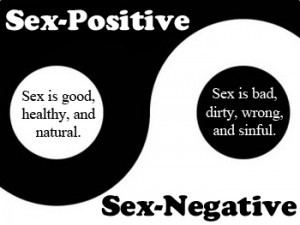The Sex-Positive Movement and the Pursuit of Happiness
 It’s a complicated world out there. There are so many currents and cross-currents out there (political, ideological, emotional) that it’s humanly impossible to sort them all out.
It’s a complicated world out there. There are so many currents and cross-currents out there (political, ideological, emotional) that it’s humanly impossible to sort them all out.
Still, when I make a special effort to fly high above the noise, a single ineluctable fact emerges.
We are in the midst of a massive and growing movement to re-invent that famous term, ‘the pursuit of happiness.’ This human right is increasingly been seen as the right to be who we really are.
Not who our parents or church or culture tell us who we should be. No—who we really, truly are.
And not only the right to be who we really are. The right to celebrate who we really are.
For sex-positive activists, this means things like the right to be sexually intimate with whoever we choose and the right to wholeheartedly embrace our amazing capacity for ecstasy.
The conversation isn’t simple. Rights come with responsibilities, and this is where things start to get tricky. What are the constraints on our ‘right to be who we really are?’ Any serious conversation must include this question.
In Sex World, the discourse tends to include responsibility. The tragedy of AIDS had a silver lining: It helped us learn how to talk responsibly about sex. We’ve come a long way from the psychedelic 60’s, when the conversation was wildly tilted toward freedom and focused far too little on responsibility. Over the years, the conversation has become more evolved. More mature.
But let’s go back to basics for a moment. The right to be who we really are doesn’t give us the right to do whatever we want to other people. The Marquis de Sade was a radical egoist: He argued for a freedom so absolute that it included the right to impose one’s will on others. Among civilized people living in civilized situations, the de Sade view has zero traction—thank goodness. The right to pursue erotic happiness, it is generally agreed, must not constrain one’s partners’ freedom to choose when, what and with whom.
Here’s a simple (and more secret than not) truth: It takes a big person to skillfully manage the tension between freedom and responsibility. It’s a lot easier to be mostly self-centered (irresponsible) or self-negating (duty!). When you successfully honor competing values (in this case, duty to self and duty to others), you’re building soul capacity. The “right to be fully who you are” movement just happens to also be in what couples therapist David Schnarch calls the “people-making” business. It’s creating emotional depth.
Which brings me to a second complication of the “be truly who you are” movement. It’s easy to write the words, ‘the right to be fully yourself.’ It’s harder to figure out what it means.
What does it mean to be authentically yourself? There’s a problem with the word ‘authentic,’ and it’s one conservatives have been noting since what they call ‘radical subjectivism’ started to make its cultural presence felt. In a world where we invent ourselves daily, authenticity is a very notional concept. Today’s authenticity is tomorrow’s delusion. Nor is there any empirical way to measure authenticity—it’s not testable.
For some, these realities put the lie to the entire authenticity paradigm. I don’t agree; I think we can know when we’re being more rather than less authentic. It’s a reasonable critique, though, especially when applied to the many misbegotten souls out there for whom authenticity translates into a license to act impulsively and immaturely.
Speaking of which: Let’s say I get really angry at my partner and end up shouting at her and calling her names. Most of the folks I hang with would call this triggered, un-evolved behavior—and I agree. The better path would be to meditatively note my upset and then communicate my feelings in a calm, non-blaming way.
This is totally in line with the emerging view of the right way to bring one’s authenticity into the world. As it’s evolving, the “be who you really are” movement comes with a big asterisk: Be who you really are, and do your best to express it through your higher self.
Thus the movement really has two components: Be who you really are, and be your most evolved you.
Reconcilable paradox or quixotic delusion? You decide.
Like I said, it’s complicated. Meanwhile what is emerging is a new vision, a new understanding, about what it means to be fully human. (And also fully wise.)
Honor yourself—and honor others equally.
Honor all your selves—and inhabit your higher self.
This is the new story about the life well and wisely led that’s trying to climb up above the noise and make its presence felt in the world.
For all its complexities and limitations, it’s our best (and, ultimately, perhaps only) hope for creating a more sane and less stupid world.
The train has left the station.
The sex-positive movement is on board.





Leave a Reply
Want to join the discussion?Feel free to contribute!